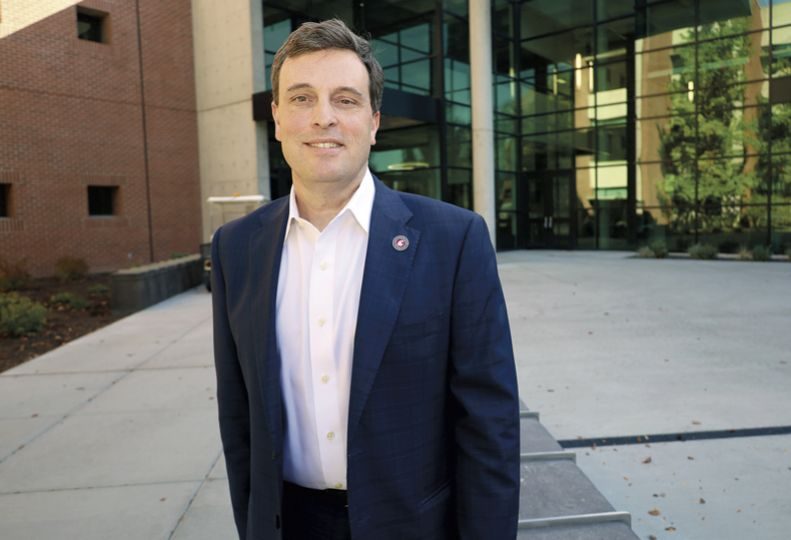
Home » Meet & Greet with WSU medical school dean Dr. James Record
Meet & Greet with WSU medical school dean Dr. James Record
~

October 26, 2023
Dr. James M. Record began his duties as the dean of Washington State University’s Elson S. Floyd College of Medicine on Oct. 1., following a yearlong interim appointment, becoming the institution’s second dean to lead the medical school.
Record previously served as the vice dean for graduate medical education, continuing medical education, and partnerships. As interim dean, Record has overseen the development of the medical school’s sponsored pediatrics residency in partnership with Providence Sacred Heart Medical Center.
Record holds a bachelor’s degree in biochemistry and sociology from Bowdoin College, in Brunswick, Maine, and received his Doctor of Medicine degree from the University of Massachusetts Medical School. He also holds a law degree from Rutgers University Law School, in New Jersey.
The Journal recently sat down with Record to discuss his new role and the mission of the medical school.
What brought you to medicine?
I wanted to have an ability to care for people. Something that was demanding, intellectually stimulating, and something that I couldn’t be stultified by. Medicine more than fits the bill.
Were you interested in the administrative side of things?
No. I grew up in a small town with a single doctor, and I thought I would do the same thing, just in a small town, enjoying life, practicing medicine. But I love teaching, and many years later and many different positions, it has brought me here. So it’s not an expectation for me. My goal was just to care for people.
How did you come to be in this role?
I had the benefit of having some pre-knowledge before I came here. I was asked to review the school while it was going through its initial accreditation. So, I got to understand some of the culture and the mission of WSU school of medicine. The mission is really why I am here.
What is the mission of the medical school?
WSU, the college of medicine is really the college by the people for the people.
We were created against significant resistance from other parties. It’s a school that is focused on Washington and changing the metrics in this community. When you look at the state of Washington, sadly, there’s some incredible health care deficits. So, our mission is to solve problems in the challenging health care environments across the state.
For us to be successful, we not only have to graduate students, we have to be able to train them in the state. It’s also going to be about changing health care metrics, particularly in counties. It’s across all of Washington, but you notice the highest concentration of astonishing disparities—some of the worst in the nation—in Eastern Washington.
There is no better mission in my mind, and no greater importance, to have a medical school that can fulfill that.
Spokane is such a medical hub. How are there these disparities here?
Even in Spokane, there are extraordinary deficits. It was made worse by the pandemic. The ability to get all that is needed, even here in the second-largest city (in the state), is still not what is needed. When you look at what the training is in this area, we don’t have sufficiency in residencies.
We don’t have sufficiency here and when you look at the outlying counties, it’s astonishing deficits that are even worse. For us, that’s the reason we are here.
What resistance did the school receive when it was being conceived?
Starting a medical school is very hard. Elson Floyd was our former WSU president, and it was really a vision that he had to create this school. Just knowing the deficits and knowing that when you look at a state as large as Washington, the average expectation would be to have about seven medical schools.
It was the will of a strong-minded president and then so much of the community that drove it. That’s really the fun part about being at WSU that you still see to this day. The community support is incredible.
In fact, that is one of the biggest challenges for us too. Because we are a community-based school, our focus is not just on what we want, it is really making sure the community is getting what it wants. So, we are always partnering, and managing all of those relationships requires a lot of effort.
What are some of those partnerships with the community?
There is almost no part of the community we’re not connected into. The goal is to make sure we’re properly representative for the community.
We have first-year students spend time out in their communities across the state to get a sense not just of the medical education, but the community itself. That’s how we manage our admission criteria; you must have ties to the state. We have folks from almost every county now in the short time that we’ve been in existence.
What are you most excited for as you step into this role?
For one, you can see the difference we’re already starting to make. Most of that is about relationships.
Seeing the incredible students who are coming through who are now graduating, who are training and will soon be graduate faculty members here—to recognize that in such a short time we’re already creating that pathway is amazing.
The ability for me to work with some incredible people who are really mission oriented. It’s hard for things to get better than that.
Latest News Education & Talent Q&A Profiles
Related Articles
Related Products




![Brad head shot[1] web](https://www.spokanejournal.com/ext/resources/2025/03/10/thumb/Brad-Head-Shot[1]_web.jpg?1741642753)
